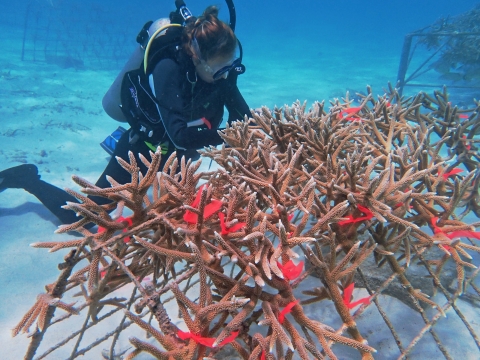Morgan Farrell, a PhD student in cell and molecular biology at San Diego State University (in a joint program with UC San Diego), is on a mission to help coral reefs survive a rapidly changing world.
“I grew up in Florida and saw firsthand how coral reefs declined due to disease, human impacts, and climate change,” Farrell said. “That really stuck with me.”
Now, with support from the San Diego ARCS Chapter, she’s researching how bacteria influence the health and development of marine invertebrates—especially corals. Her focus is on a critical process called settlement, when coral larvae attach to a surface and begin their transformation into adult corals.
“This stage is essential for coral survival, and we’ve found that certain bacteria can trigger it,” she explained. “What’s fascinating is that the same molecule—LPS, or lipopolysaccharide—that can cause septic shock in humans is beneficial in this marine environment.”
Farrell discovered that a group of bacteria known as alphaproteobacteria consistently helps initiate coral settlement. This insight led her to develop a restoration tool that uses these bacteria to increase the number of coral larvae that successfully grow into adult corals.
“I’ve created a biotechnological product that enhances coral restoration outcomes,” she said. “It’s based on a natural process—we’re just harnessing it in a way that can help coral populations recover.”
With a provisional patent already in place, Farrell’s goal is to refine the tool so it can be used across a range of coral species and restoration sites worldwide.
Beyond her research, Farrell is passionate about raising awareness of the importance of coral reefs.
“Coral reefs are nurseries for many of the fish we eat, and their decline impacts global food security,” she said. “They also protect coastlines from storm damage and support immense biodiversity. If we lose them, we lose entire ecosystems.”
Farrell’s path to science was unexpected. The first in her family to attend college, she hadn’t considered research as a career until an undergraduate lab opportunity changed her course.
“My family isn’t in science, so I didn’t even realize this could be a profession,” she said. “But that first lab job opened the door.”
As an ARCS Scholar, Farrell says the support has been transformative.
“It’s lifted financial stress and allowed me to focus fully on my research,” she said. “And I’ve had amazing opportunities to share my work, including presenting at the Scientist of the Year event. The feedback and encouragement have been incredible.”
Farrell hopes her work will lead to more effective coral restoration and inspire others to see how science can make a tangible impact.

